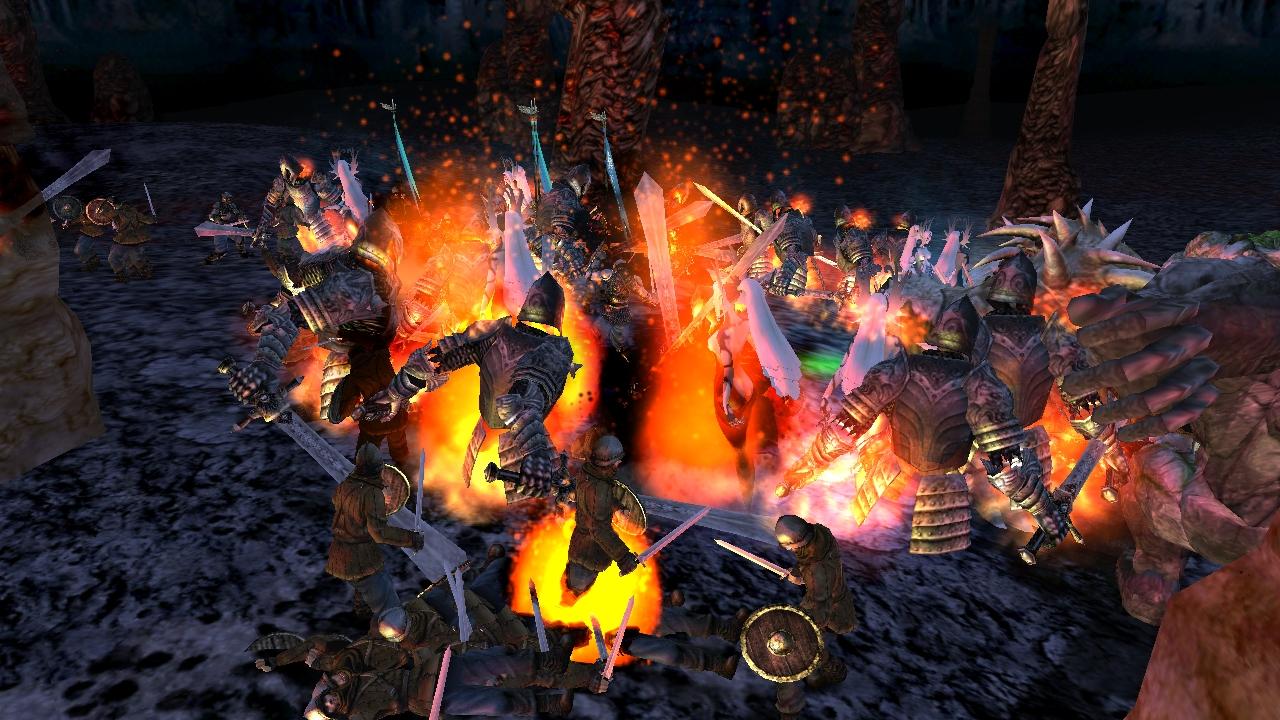Why you can trust GamesRadar+
It's more than that though; these elements are a chance to truly appreciate the battles up close, and really see how each individual unit AI has been crafted for an intelligent battle experience.
Nothing comes close to the levels of fluid animation interaction (ie smoothly bopping each other on the head) that KUF has achieved.
Technically, this is the work of a masterful development team. Heroes is radically different from probably anything you've ever played, and is gripping, demanding action from the word go.
But it's with a more than heavy heart that we accept that this sequel doesn't do enough to erase the memory of its predecessor's mistakes.
Take the camera. It zooms in on your selected troop when too many enemies arrive to prevent the on-screen enemy count from going past (a staggering) 300, and hence removes any slowdown. However, this all but cripples your ability to direct from the third-person view, leaving the mini-map as your only option.
And the draw distance... this might sound sensationally petty in light of the fact that the game is visually untouchable, but in a strategy game, you need to see what's going on all around you.
We can't help but wonder if maybe we could have lived without being able to see each of Ellen's exquisitely modelled eyebrows, had we been viewing them from half a mile away.
Why wasn't a more normal-for-the-genre raised camera used? But there's a much bigger problem. The whole action/strategy concept itself.
Yes, there's more depth in this game than there is water in the North Sea - using archers to set fire to the forest through which the enemy is retreating, directing siege weapons on to an enemy, causing them to scatter into the path of your oncoming cavalry - there's probably more than we could list even if we dedicated all the pages of the magazine to the task.
The flaw here lies with your hero - you can see a problem, and too often, the only feasible solution you can think of is to run over right into the middle of it all and bash things over the head with your oversized blunt weapon (no, the other one). It's a raw action-induced solution, but not a tactical one.
As any movie aficionado will know, in Hollywood this heroes and tactics approach makes for simply the best battle scenes imaginable (think Russell Crowe shining as both leader and fighter in the huge scraps that make up most of Gladiator) but in gameplay terms, we eventually realised that this approach is simply not ideal - we don't actually want to be a hero.
We want to command. If you could control the leader of any of your platoons, that would have been fine, but controlling one at the expense of doing more complex manoeuvres with other units? Please, please tell us why this decision was made.
Your choice of tactics plainly sways the fight massively - you can hide in a forest and take out a slowly moving platoon from the rear, waiting until after they pass without seeing you - yet in battle, you can't shake a feeling of helplessness as you tell your maximum-of-three extra brigades to duke it out and then go storming round the battlefield all on your lonesome.
Let this be the defining word on the matter; before Xbox even existed, Fable mastermind Peter Molyneux created arguably the first action/strategy game in the form of Populous: The Beginning.
The fights were obviously nowhere near as intense as those to be found here, but other than that, this masterwork excelled in all areas, and it's this fact that makes us see how Heroes could have been improved to perfection, instead of compromising long term enjoyment for the sake of accessibility.
But then again, it's a good job you kept reading through all this misery (well done you), because if we've made the game sound irredeemably flawed then sorry, that wasn't actually the intention. Each of the problems are generally only short-term, and most of them are things that some might never even notice.
Compared to the majority of the generic tat that gets shovelled our way, this game is simply outstanding, and it's important that you understand the flaws we've highlighted are the result of extended play and the quest for deeper strategy; the converse angle is that it's brilliantly intuitive and accessible for all.
By asking for increased strategy at the expense of action, we're asking for more where there is already a helluva lot, so it's worth remembering this - we're glad we've played this, and played it extensively. Our gaming lives would have been poorer without it.
As you may have guessed, it's been that tired but true cliche - one hell of a tough call.
Flawed though it is, any gamer worth their salt will want to master the game's impressive intricacies, and of course take their scheming strategies to the next level on Xbox Live... and to be honest, what more can you ask for in an Xbox game than that? Precisely.
Kingdom under fire: Heroes is out now for Xbox
More info
| Genre | Action |
| Description | This score isn't a don't buy, it's a 'yes, get it - but careful, it might bite.' In the end, you will enjoy this. Just like us. |
| Platform | "Xbox" |
| US censor rating | "Mature" |
| UK censor rating | "" |
| Release date | 1 January 1970 (US), 1 January 1970 (UK) |



